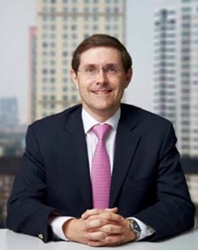High Voltage – Thailand Positions its Automotive Industry for an EV Future
 |
Dennis Meseroll ย– Executive Director
Tractus Asia |
The era of electric vehicles (EV) is upon us and the global automobile industry is now deliberately re-tooling its supply chain to gear up for an electric future. While EVs represent a fundamental shift in automotive drive train technology, resulting in some new entrants like BYD and Tesla, the existing automotive supply chain doesnย’t need such a radical redesign to support this shift. EV assembly and electric vehicle component manufacturing will remain largely concentrated in existing automotive industry clusters globally and countries are competing for a chance to win these new EV investments. As the worldย’s 11th largest motor vehicle manufacturing country with new incentive policies to promote investments in the EV supply chain, Thailand is poised to solidify its position as a hub for ASEAN EV manufacturing.
To capitalize on the shift to EVs, Thailand developed a National Electric Vehicle policy and executive committee to oversee it. Deputy Prime Minister Somkid Jatusripitak, Chairman of the Committee, announced on 11 March 2020 that ย“the goal is to become an ASEAN hub for EVs in 5 yearsย”. The cross functional National Electric Vehicle Policy Committee incorporates the Ministry of Industry, Ministry of Energy and the Ministry of Transport and is responsible for developing a national strategy for promoting investment in the industry and designing incentives to encourage investments in both vehicles and batteries.
Thailand has a proven track record of success in developing practical policies and investment incentives that have resulted in building successful industrial clusters. In 1997, to encourage the domestic production of 1-ton pick-ups, the government focused its incentives policies on promoting investments for what was called Thailandย’s automotive industry product champion. Thailandย’s tax and non-tax incentives and local content regulations attracted global pick-up truck assemblers and hundreds of their Tier-1 and Tier-2 suppliers to invest in Thailand. As a result, production, domestic sales and exports of pick-ups grew considerably from 1997 to 2008 and Thailand cemented its place as the second largest production base for pick-up trucks in the world, with all major global pick-up assemblers having at least one manufacturing facility in the country. Leveraging the success in pick-up trucks, investment incentives were extended in 2009 to passenger vehicles and further extended to eco-vehicles (passenger cars with engines of less than 1300 cc). EVs will be the newest beneficiary of the Thailandย’s well regarded and successful investment incentives programs.
Thailandย’s EV incentives seek to promote investments across the supply chain for all types of EV technology: hybrids, plug-in hybrids and fully electric vehicles. To accelerate EV production, the Thailand Board of Investment (BOI) developed investment incentives that include import duty exemptions on raw materials and capital equipment as well as corporate income tax holidays for up to 8 years. Global vehicle manufacturers seeking to expand their EV production have already taken advantage of these new incentives, including BMW, FOMM, Honda, Mazda, Mercedes-Benz, Mine Mobility, Mitsubishi, Nissan, SAIC Motor-CP and Toyota. Thailandย’s EV investment incentives extend along the supply chain. In to assembly, 13 types of EV components such as batteries, traction motors and battery management systems (BMS) amongst others. EV assemblers and component manufacturers, including Toyota, Honda, Drรคxlmaier, MHI automotive Climate Control and SWS Motors have taken advantage of these incentives to begin producing battery components in Thailand.
Thailand is well positioned to offer companies managing the transition to EVs a world class vehicle and component manufacturing infrastructure in addition to being able to leverage its strengths in electronics and electrical components. Thailandย’s globally competitive operating cost, conditions and production scale, complemented by what are regarded as the best investment incentives in Asia, make it a perennial favorite to be included on automotive investors site location short-list. ย
About Dennis Meseroll
As Tractusย’ Executive Director and a founding partner of the company, Dennis brings more than 20 years of consulting experience having advised hundreds of companies on their direct investment, market entry and market expansion strategies in Asia. Since 1995, Dennis has been the project leader of operational and financial feasibility assessments, site location analyses, real estate and investment incentives negotiations and transactions as overseen dozens of corporate entity establishments and investment approvals through to operational start-up.
As a thought leader in the foreign business community in Asia, Dennis has acted as an advisor to the investment promotion agencies of the governments of China, Indonesia, Malaysia, Mongolia, the Philippines and Thailand; the Ministry of Finance of the government of Pakistan; the trade promotion agencies of the states of Ohio and New Jersey as well as The World Bank, Multilateral Investment Guarantee Agency and the ASEAN Secretariat on the development of trade promotion and investment attraction strategies in Asia.









